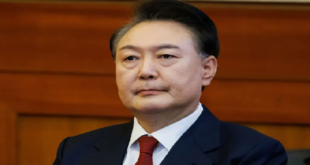20-02-2023
BEIJING: As China declares victory over the pandemic, the landmark protests in November which spelled the end for zero-COVID rules have begun fading from memory but as the country moved on, many of those who took part in the demonstrations went missing, taken by authorities in a quietly deepening crackdown on dissenters.
 Thousands rallied against restrictive COVID policies in the so-called White Paper protests, holding up blank white sheets in the dark. It was a rare show of criticism of the ruling Chinese Communist Party and its leader Xi Jinping.
Thousands rallied against restrictive COVID policies in the so-called White Paper protests, holding up blank white sheets in the dark. It was a rare show of criticism of the ruling Chinese Communist Party and its leader Xi Jinping.
Police made few arrests at the time. Now, months on, scores of those protesters are in police custody, say Chinese activists, with one group estimating there have been more than 100 arrests.
International rights groups and foreign universities have called for their release. And activist groups have published lists naming the alleged detainees. This includes those who protested in Beijing as well as other cities such as Shanghai, Guangzhou, and Nanjing.
Chinese authorities have not responded to queries on the detentions but through interviews with friends and lawyers, media was able to verify the names of 12 people arrested in Beijing.
At least five of them have been released on bail. Among those still in custody, four women – Cao Zhixin, Li Siqi, Li Yuanjing and Zhai Dengrui have been formally arrested for “picking quarrels and provoking trouble”. This is a notoriously vague charge that carries a maximum sentence of five years, and one which critics say is often used to stifle dissent.
Many of those arrested are well-educated some attended universities in the UK and the US – and they include writers, journalists, a musician, a teacher and a financial industry professional.
Most of the Beijing detainees were part of a loose network of friends who shared a love for the arts and often met at book clubs, movie screenings and discussions.
Many of them are women, and according to reports, police have questioned them about whether they were feminists or involved in “feminist activities”. Chinese authorities have increasingly cracked down on or censored women’s rights activists in recent years.
Though the group was socially conscious, and some members had shown support for #MeToo figure Xianzi, they were not activists, their friends insisted.
“They are just a group of young people concerned about society… my friend is interested not just in women’s rights, but also human rights and the rights of the vulnerable. This has nothing to do with feminist-related activities,” said one of the detainees’ friends.
 On 27 November, several women from the group had joined a public vigil at Liangma River in Beijing.
On 27 November, several women from the group had joined a public vigil at Liangma River in Beijing.
The event was one of many spontaneously held across China that night to mourn the victims of an apartment fire in Urumqi which had shocked China – many believed the victims could not escape because of COVID restrictions, though authorities disputed this.
The vigil turned into a peaceful protest, with people holding blank pieces of paper that became a symbol of their frustration.
“The environment has been so oppressive for so long. They didn’t think they were participating in a movement when they went. They thought it was just a way to vent their emotions,” another friend said.
“They didn’t clash with police or express radical opinions. So they didn’t think it was serious.” (Int’l News Desk)
 Pressmediaofindia
Pressmediaofindia





